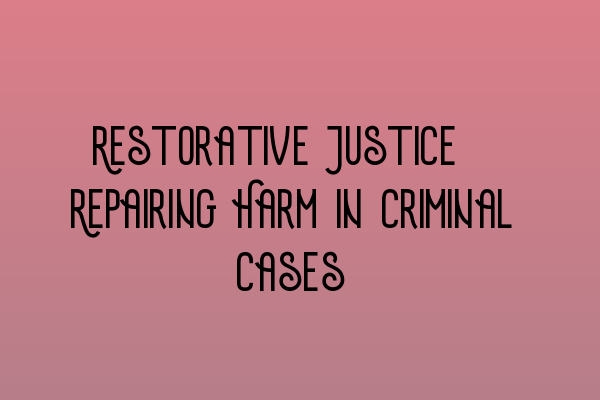Restorative Justice: Repairing Harm in Criminal Cases
Welcome to the SQE Criminal Law & Practice Law UK blog! Today, we’re discussing the concept of restorative justice and its role in repairing harm in criminal cases. Restorative justice offers an alternative approach to traditional punitive measures by emphasizing accountability, dialogue, and reconciliation between offenders, victims, and the community. This innovative approach aims to address the underlying causes of criminal behavior, promote healing, and restore relationships.
The Principles of Restorative Justice
Restorative justice is guided by several key principles, which form the foundation for its application:
- Respect: Respecting the dignity and humanity of all individuals involved, including both the offender and the victim.
- Accountability: Encouraging offenders to take responsibility for their actions and make amends for the harm caused.
- Reparation: Focusing on repairing the harm caused and addressing the needs of the victim, as well as the community affected.
- Inclusion: Ensuring that all affected parties have the opportunity to participate in the restorative process, including victims, offenders, and community representatives.
- Collaboration: Facilitating open dialogue and cooperation between all parties involved to reach a mutually acceptable resolution.
By adhering to these principles, restorative justice offers a holistic and transformative approach to handling criminal cases.
The Benefits of Restorative Justice
Restorative justice has gained significant recognition and support due to the array of benefits it provides:
- Empowerment: Victims are given a voice and an opportunity to express their feelings, concerns, and needs.
- Healing and Closure: The restorative process assists victims in finding closure and healing, which can be crucial for their emotional well-being.
- Offender Accountability: Restorative justice holds offenders directly accountable for their actions, prompting them to confront the consequences of their behavior.
- Reduced Recidivism: Research indicates that restorative justice can be effective in reducing repeat offenses, as offenders gain insight into the impact of their actions and work towards reintegration.
- Community Engagement: Restorative justice promotes community involvement and encourages a sense of collective responsibility for addressing crime.
If you’re interested in learning more about SQE Criminal Law & Practice Law UK, check out these related articles:
- SQE 1 Practice Exam Questions
- SQE 1 Practice Mocks FLK1 FLK2
- SQE 2 Preparation Courses
- SQE 1 Preparation Courses
- SRA SQE Exam Dates
Conclusion
Restorative justice offers a fresh perspective on criminal cases, focusing on repairing harm, fostering accountability, and encouraging healing. It provides an opportunity for victims, offenders, and communities to actively participate in the resolution process and work towards restoring relationships. As we continue to explore alternative approaches to criminal justice, restorative justice holds immense promise in transforming our legal system into a more inclusive, compassionate, and effective model.
For more information and insights on criminal law and practice, stay tuned to SQE Criminal Law & Practice Law UK blog!
